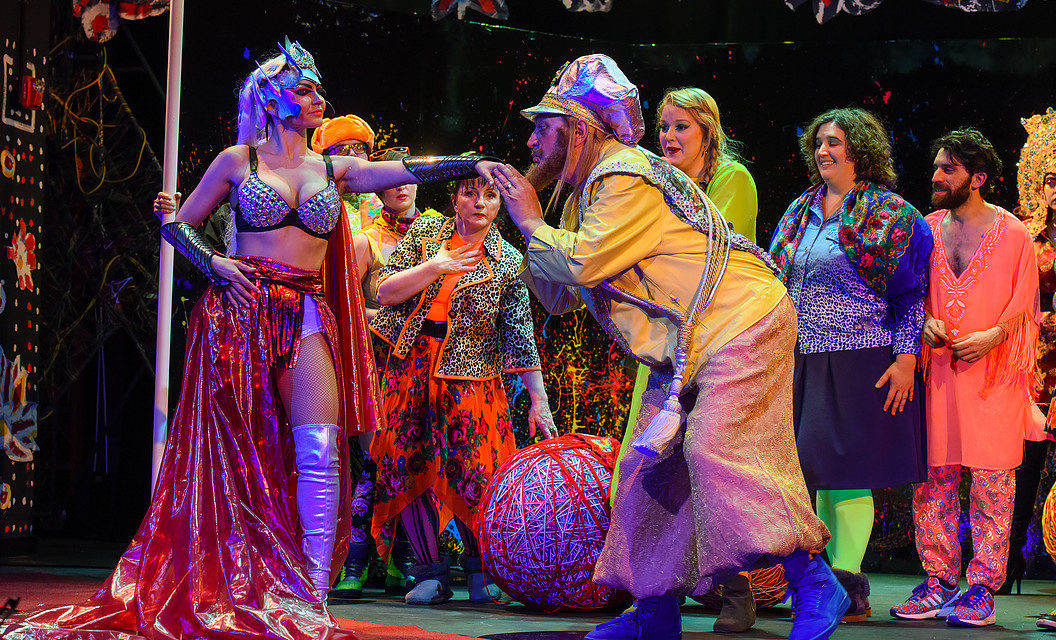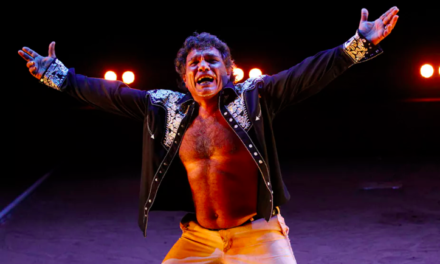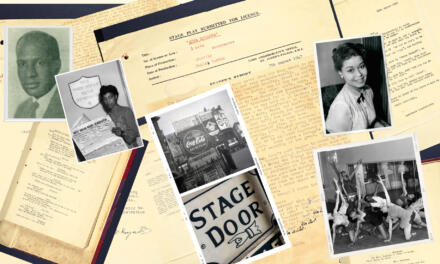In December 1913, Russian Futurist opera Victory Over The Sun premiered in Saint Petersburg, the work of playwright Alexey Kruchenykh, designer Kazimir Malevich, and composer Mikhail Matyushin. The opera was a bizarre, avant-garde creation: Kruchenykh’s invented poetic language of zaum (“transreason” or “beyonsense”) filled the libretto, while Malevich’s designs evoked the abstract, geometrical forms of the fledgeling Suprematism. And Matyushin’s score—much of which has been lost—was, in the words of company member K. Tomashevsky, “like a parody of Verdi,” the actors required “to intentionally sing off pitch.” The opera’s creators measured its success by the uproar of the audience, as Tomashevsky reported: “[Kruchenykh] enthusiastically watched the angry audience through a crack in the curtains…‘What a success! What a remarkable success!’”*
Today, just over 100 years since Victory Over The Sun’s premiere, New Opera NYC and a team of collaborators are creating a new opera, Black Square, inspired by the Futurist showpiece and named for Malevich’s famous painting. Black Square is an English-language, avant-garde opera, created first and foremost for American audiences: not a museum piece but a new work of theatre, intended to bring something of Kruchenykh and Malevich to life today, simultaneously moving and delighting contemporary audiences. After more than two years of intense development, Black Square is on its way to the stage, beginning with two workshops at the Lyric Theatre @ Illinois, in December 2017 and March 2018.

Black Square, poster for the opera. Copyright New Opera NYC.
Black Square was conceived by Igor Konyukhov, artistic director of New Opera NYC, who co-authored the libretto with Olga Maslova (decorated costume designer and assistant professor of theatre at UIUC). The music was composed by award-winning Russian composer Ilya Demutsky, who won the 2016 Golden Mask award for the ballet A Hero Of Our Time at Moscow’s Bolshoi Theatre, where he also created the music for the much-anticipated and controversial ballet Nureyev, which opens this month. The story of Black Square’s creation is one of serendipity, perseverance, and love. I had the opportunity to sit down with the creative team as well as with producer Nadia Artman to discuss the opera.
If Victory Over The Sun is purposefully obtuse and impossible to understand, the musicality of its poetry yet leaves a visceral impression that Konyukhov and the others wanted to capture and transmit to contemporary audiences. Konyukhov explains: “Roughly three years ago, I was told about Victory Over The Sun, I read it, of course, I didn’t understand anything at first. But somehow there was a residual feeling that was very stimulating. At that time there was the idea of restaging it or doing a revival. But after looking at it carefully, I realized that the way that it’s written is not really digestible nowadays. There is shock value, but some of the things that were in the text are almost mainstream in their shock value nowadays. They wanted to shock, but today it wouldn’t have that effect. At first, the idea was to adapt the libretto to new music. We knew that it would need to be composed or compiled somehow because the music was not preserved […] But we weren’t really sure about the text. I was working on it a little, looking at translations. I was looking at one that was considered rather scientific. In Russian, there’s double and triple meanings, but the translator had chosen one of the options, cutting off all the residual meanings. I knew that we wanted to preserve those somehow.”

Yichen Li, Ryan Johnson, Steven Michel Patrick, Stephen Condon, Sadie Cheslak, and Dean Moore in workshop presentation of Black Square, Lyric Theatre @ Illinois, December 2017.
Maslova speaks similarly of Victory Over The Sun as a work that was difficult for her to access and that yet had a latent, measurable impact on her. When I asked her if she had been a fan of Victory Over The Sun before beginning work on Black Square, she laughed: “Oh God no; I hated it […] Victory Over The Sun is not an opera… it’s a bunch of people who were driven to do something new—people just screaming the words, very provocational. They didn’t really go for the musical quality or anything; it was just a performance piece, to shake things up […] I did not particularly understand the appeal of pure abstraction. But I did love the poems. Several of them really shook me. And then I started reading more poems of Kruchenykh—some deal with pure suffering, pure lust, loss, things like that. I started thinking about how we can, using the new form of language, express very universal things […] To Igor, what was interesting is that, gradually, there are no words anymore, but abbreviations, the destruction of language, the simplification of emotion. We just basically went in, treated Victory Over The Sun like a community garden, picked up things that we liked.”
The team speaks of the serendipitous events that drew them together in this project. A mutual colleague introduced Maslova to Konyukhov not as a librettist but as a costume designer—and yet Maslova, who has an MFA in dramaturgy, quickly joined in the writing process: “It was like a vortex, like jumping into a black square—I didn’t even really have time to think about it,” she reminisced. Konyukhov was on the search for a composer about the same time, when he happened across an article about Demutsky and his provocative opera New Jerusalem: “I went on YouTube, listened to one piece, and then I listened to all his pieces like three times.” Among these YouTube pieces was a four-minute creation of Demutsky’s called Black Square—composed for an electronic music class and inspired by Malevich. Konyukhov took it as a sign that the collaboration was meant to be.

The creative team behind Black Square. From left: Ilya Demutsky, Olga Maslova, and Igor Konyukhov.
Over the next two years, the team collaborated on the opera, working almost entirely over Skype, logging upwards of twenty hours per week in the first year. The libretto is fully in English—“purely a Western production,” explains Maslova—thus necessitating painstaking translation efforts. Maslova stresses that “It’s not a very pure translation… we needed to have the essence, but it has to be singable. The demands of an actual opera were very important. This cannot be translated back into Russian. It will be performed in Russia to be sure, but it cannot be performed in Russian. Every word, intonation, and slight variation is written with music in mind.” The process was at times tedious: Konyukhov and Maslova scrapped an early draft when they realized that it wasn’t reflecting the ideas that they hoped to see in the opera. The team was also challenged to impose a linear storyline in the opera, one that would allow audiences to follow along and enjoy the experience even if they could not understand the combination of words and sounds that make up individual lines.
What do the creators hope that audiences take from Black Square? When I posed this question to the creative team, Konyukhov was quick to respond that he wants to leave audiences wondering, bewildered, even, asking “What the hell was that?” But, he stressed, “this is only the first layer.” Demutsky declared, “I will be happy if people perceive it as a complex work—not just ‘wow, good music’ (or text, costumes, production)—No. It’s something complex, that cannot be separated. A new kind of art.” Artman elaborated on this notion, speaking about the need for the opera, once completed, to be perceived “as an event:” “It’s important for people to be inside the experience; even when they first come in, they should be greeted by people in Suprematist costume. I want people on the edge of their seats, asking ‘Okay, what’s next?’ As a producer, I want people holding their breath: You breathe in, and you breathe out only when it’s over.” Maslova, finally, spoke not just to the exotic nature of the piece but to its enjoyability, its potential to be a source of delight: “it should be like a ten-course dinner on an alien planet. All the ingredients are new, unfamiliar; the combinations are weird and strange; but it’s still a fantastic meal, with everything there—humor, tragedy, music, all the components. And it’s new, but it’s still deeply satisfying. We just want it to be really enjoyable, but with all new ingredients.”
*K. Tomashevsky, Victory Over The Sun, The Drama Review: TDR 15, no. 4 (1971): 92–106.
The first act of Black Square will be performed as a workshop piece with piano accompaniment in Urbana, IL, on December 13, 2017, as part of Ten Days that Shook the World, a UIUC symposium on the 1917 Russian Revolution. This workshop is a production of Lyric Theatre @ Illinois, with support provided by the Krannert Center for the Performing Arts and the UIUC Russian, East European, and Eurasian Center. A second workshop, with orchestra, will follow in Urbana in March 2018. The opera’s full premiere date is still TBD but may happen as early as 2018. For more on the December event, see the Krannert Center event page. For more on Black Square, including costume renderings and footage from an early rehearsal, see the production website.
This post was written by the author in their personal capacity.The opinions expressed in this article are the author’s own and do not reflect the view of The Theatre Times, their staff or collaborators.
This post was written by Jessica Hinds-Bond.
The views expressed here belong to the author and do not necessarily reflect our views and opinions.


















